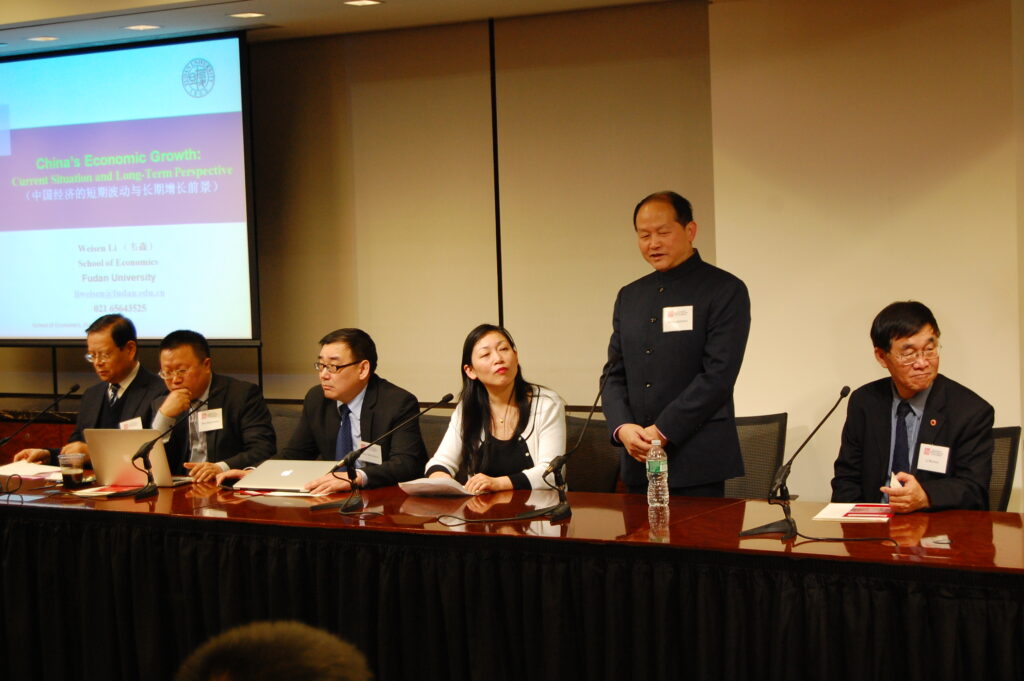Thursday, February 27, 2014 | 5:30 PM EST - 5:30 PM EST
, New York, NY
At a National Committee program hosted by Sidley Austin on February 27, 2014, a delegation from the Consensus Media Group (CMG) led by CMG CEO Zhou Zhixing took part in a wide-ranging discussion of some of the critical issues facing China and U.S.-China relations. Professor Li Weisen, vice dean of the School of Economics at Fudan University, addressed "China's Economic Growth: The Current Situation and Long-Term Prospects"; Mr. Yang Hengjun, editor-in-chief of World Chinese Weekly, looked at "The Internet and Sino-U.S. Relations"; and Professor Mao Shoulong, executive vice dean of the Academy of Public Policy at Renmin University of China, explored "State Building and the Future of Chinese Governance."
The speakers listed above were part of a delegation that included Dr. Ma Yong, Institute of Modern History at the Chinese Academy of Social Sciences (CASS); Dr. Cai Xia of the Central Party School; Professor He Weifang of Peking University's School of Law; and Dr. Liu Peng of the Institute of American Studies at CASS. Observers traveling with the delegation included Mr. Xin Lijian, CEO, Xinfu Education Consulting Group; Mr. Wu Zuolai, fellow, Chinese National Academy of Arts; Ms. Yu Shan, former aide to Mme Deng Rong; and Ms. Zhang Juan, editor, CMG.
Bios:
Zhou Zhixing (周志兴), a well-connected publisher and a distinguished political commentator, is the founder, president, and editor-in-chief of both Leaders and Financial Digest, two increasingly prominent journals in China today. He is also the founder of Consensus Net, a digital platform for political debate within China. He began his career at the Central Party Literature Research Office, conducting research on former president Liu Shaoqi. He was also the leading force behind the establishment of its Central Documents Publishing House.
Ma Yong (马勇) works for Chinese Academy of Social Sciences (CASS) as a fellow at the Institute of Modern History, and he is also a professor at the CASS Graduate School. In recent years he has written numerous papers and books about Chinese modern history such as Chinese Revolution in 1911, and To Tolerate the Imperfections of History which have been widely read and discussed by social science scholars.
Cai Xia (蔡霞) was born into a Chinese military family and worked for the army for many years. She graduated from the Central Party School in 1998 with a doctoral degree in law. She is now a professor in the Department of Party Building in the Central Party School. She is known for her candid and thoughtful views in ideology.
Li Weisen (李韦森) is the vice dean of the School of Economics at Fudan University. He is one of the most authoritative economists in his main research area, institutional economics and comparative institutions. Since the early eighties, he has published papers in renowned academic journals and frequently written columns on influential newspapers.
He Weifang (贺卫方) is a professor at Peking University Law School. He was nominated as one of 100 Young People of Impact on China in the 21st Century in 2001 by the popular magazine Chinese Youth. In 2011, he published To Chongqing’s Legal Profession, which presented his disapproval of the tough governance measures taken by Bo Xilai’s Chongqing government.
Liu Peng (刘澎) is a fellow at the CASS Institute of American Studies. His representative work is Contemporary American Religion published in 2011. He has devoted himself to research on the relationship between American religions and politics for many years. His main concern in recent years is the study of religion and monocracy.
Yang Hengjun (杨恒均) is the editor-in-chief of World Chinese Weekly, and worked for the Ministry of Foreign Affairs in Beijing, the Hainan Provincial People’s Government, a Hong Kong-based company and the Atlantic Council of the United States as senior fellow. He is also a prominent Internet writer and a frequent media commentator in China.
Mao Shoulong (毛寿龙) is the executive vice dean at the Academy of Public Policy of Renmin University of China. His main research fields are institutional analysis and public policy, self governance, NGOs and public services. He is a frequent media speaker.
